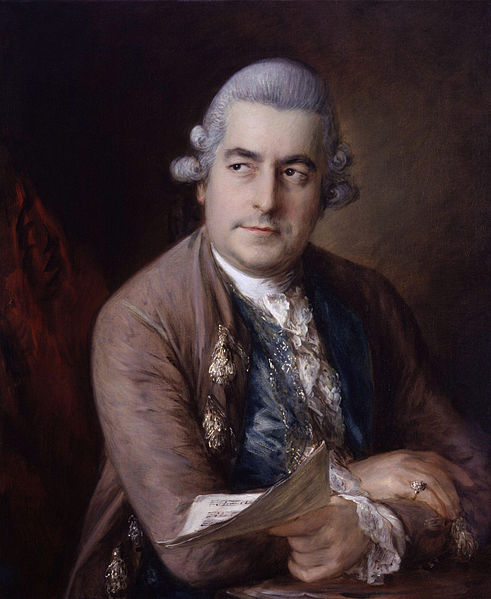<Back to Index>
- Jurist Pierre Théodore Verhaegen, 1796
- Composer Johann Christian Bach, 1735
- 2nd President of India Sarvepalli Radhakrishnan, 1888
PAGE SPONSOR

Johann Christian Bach (September 5, 1735 – January 1, 1782) was a composer of the Classical era, the eleventh and youngest son of Johann Sebastian Bach. He is sometimes referred to as 'the London Bach' or 'the English Bach', due to his time spent living in the British capital. He is noted for influencing the concerto style of Mozart.
Johann Christian Bach was born to Johann Sebastian and Anna Magdalena Bach in Leipzig, Germany. His distinguished father was already 50 at the time of his birth, which would perhaps contribute to the sharp differences between his music and that of his father. Even so, his father first instructed him in music and that instruction continued until his death. After his father's death, when Johann Christian was 15, he worked with his second oldest half brother Carl Philipp Emanuel Bach, who was twenty - one years his senior and considered at the time to be the most musically gifted of Bach's sons.
He enjoyed a promising career, first as a composer then as a performer playing alongside Carl Friedrich Abel, the notable player of the viola da gamba. He composed cantatas, chamber music, keyboard and orchestral works, operas and symphonies. Bach lived in Italy for many years starting in 1756, studying with Padre Martini in Bologna. He became organist at the Milan cathedral in 1760. During his time in Italy, he converted from Lutheranism to Catholicism. In 1762, Bach travelled to London to première three operas at the King's Theatre, including Orione on 19 February 1763. That established his reputation in England, and he became music master to Queen Charlotte.
He met soprano Cecilia Grassi in 1766 and married her shortly
thereafter. She was his junior by eleven years. They had no children. Johann
Christian Bach died in London on New Year's Day, 1782. He was buried in
the St. Pancras Old Church graveyard, St Pancras, London. Johann
Christian Bach's father died when Johann Christian was only fifteen.
This is perhaps one reason why it is difficult to find points of
similarity between the music of Johann Sebastian Bach and that of
Johann Christian. By contrast, the piano sonatas of Carl Philipp
Emanuel Bach, Johann Christian's much older half brother, tend to
invoke certain elements of his father at times, especially with regard
to the use of counterpoint. (C.P.E. was 36 by the time J.S. died). Johann Christian's highly melodic style differentiates his works from those of his family. He composed in the Galante style incorporating balanced phrases, emphasis on melody and accompaniment, without too much contrapuntal complexity. The Galante movement opposed the intricate lines of Baroque music, and instead placed importance on fluid melodies in periodic phrases. It preceded the classical style, which fused the Galante aesthetics with a renewed interest in counterpoint. The symphonies in the Work List for J.C. Bach in the New Grove Bach Family listed
ninety - one works. A little more than half of these, 48 works, are
considered authentic, while the remaining 43 are doubtful. By comparison, the composer sometimes called "the Father of the Symphony," Joseph Haydn,
wrote 104 symphonies. Most of these are not fully comparable to Johann
Christian Bach's symphonies, because many of Johann Christian's works
in this category are closer to the Italian sinfonia than
to the late classical symphony in its most fully developed state as
found in the later works in this category by Haydn and Mozart. Using
comparative duration as a rough means of comparison, consider that a
standard recording of one of Bach's finest symphonies, Op. 6 No. 6 in G
minor, has a total time of 13 minutes and 7 seconds (as performed by Hanover Band directed by Anthony Halstead), while Haydn's "Surprise" Symphony in a typical recording (by Ádám Fischer conducting the Austro - Hungarian Haydn Orchestra) lasts 23 minutes and 43 seconds. It
is clear that the listener of J.C. Bach's symphonies should come to
these works with different expectations from the ones he or she brings
to those of Haydn or Mozart. Concert halls today are frequently filled
with the music of Haydn, and comparatively rarely with that of J.C.
Bach. But J.C. Bach's music is more and more being recognized for its
high quality and significance. The Halstead recording mentioned above
is part of a complete survey of this composer's orchestral works on 22 CDs for the record label CPO, and the complete works of J.C. Bach have now been published in The Collected Works of Johann Christian Bach. A full account of J. C. Bach’s career is given in the fourth volume of Charles Burney's History of Music. There are two others named Johann Christian Bach in the Bach family tree, but neither was a composer. Mozart esteemed J.C. Bach's music highly and arranged three sonatas from the latter's Op. 5 into keyboard concertos.